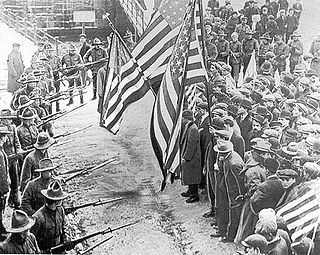
Left-wing politics describes the range of political ideologies that support and seek to achieve social equality and egalitarianism, often in opposition to social hierarchy as a whole or certain social hierarchies. Left-wing politics typically involve a concern for those in society whom its adherents perceive as disadvantaged relative to others as well as a belief that there are unjustified inequalities that need to be reduced or abolished through radical means that change the nature of the society they are implemented in. According to emeritus professor of economics Barry Clark, supporters of left-wing politics "claim that human development flourishes when individuals engage in cooperative, mutually respectful relations that can thrive only when excessive differences in status, power, and wealth are eliminated."

Ayatollah Ruhollah Musavi Khomeini was an Iranian Islamic revolutionary, politician and religious leader who served as the first supreme leader of Iran from 1979 until his death. He was the founder of the Islamic Republic of Iran and the leader of the Iranian Revolution, which overthrew Shah Mohammad Reza Pahlavi and ended the Iranian monarchy.

The Cultural Revolution, formally known as the Great Proletarian Cultural Revolution, was a sociopolitical movement in the People's Republic of China (PRC) launched by Mao Zedong in 1966, and lasting until his death in 1976. Its stated goal was to preserve Chinese communism by purging remnants of capitalist and traditional elements from Chinese society. Though it failed to achieve its main goals, the Revolution marked the effective, ultimately permanent return of Mao to the center of power. This had come after a period of relative abstention for Mao, who had been sidelined by the more moderate Seven Thousand Cadres Conference in the aftermath of the Great Leap Forward and the following Great Chinese Famine, which occurred while he was still chairman of the Chinese Communist Party (CCP).

Maoism, officially called Mao Zedong Thought by the Chinese Communist Party (CCP), is a variety of Marxism–Leninism that Mao Zedong developed to realize a socialist revolution in the agricultural, pre-industrial society of the Republic of China and later the People's Republic of China. The philosophical difference between Maoism and traditional Marxism–Leninism is that a united front of progressive forces in class society would lead the revolutionary vanguard in pre-industrial societies rather than communist revolutionaries alone. This updating and adaptation of Marxism–Leninism to Chinese conditions in which revolutionary praxis is primary and ideological orthodoxy is secondary represents urban Marxism–Leninism adapted to pre-industrial China. Later theoreticians expanded on the idea that Mao had adapted Marxism–Leninism to Chinese conditions, arguing that he had in fact updated it fundamentally and that Maoism could be applied universally throughout the world. This ideology is often referred to as Marxism–Leninism–Maoism to distinguish it from the original ideas of Mao.

The Fourth International (FI) was established in France in 1938 by Leon Trotsky and his supporters, having been expelled from the Soviet Union and the Communist International.
Agricultural revolution may refer to:

The Iranian Revolution, or the Islamic Revolution, was a series of events that culminated in the overthrow of the Pahlavi dynasty in 1979. The revolution also led to the replacement of the Imperial State of Iran by the present-day Islamic Republic of Iran, as the monarchical government of Mohammad Reza Pahlavi was superseded by the theocratic government of Ayatollah Ruhollah Khomeini, a religious cleric who had headed one of the rebel factions. The ousting of Pahlavi, the last Shah of Iran, formally marked the end of Iran's historical monarchy.
A revolution is a drastic political change that usually occurs relatively quickly. For revolutions which affect society, culture, and technology more than political systems, see social revolution.
Equality generally refers to the fact of being equal, of having the same value. In specific contexts, equality may refer to:
Whig or Whigs may refer to:

The Revolution is an American band formed in Minneapolis, Minnesota, in 1979 by Prince, serving as his live band and later as his studio band. The band's sound incorporated rock, pop, R&B, funk, new wave and psychedelic elements. Along with Prince's other projects, the Revolution helped create the Minneapolis sound. By the time of their 1986 breakup, the Revolution had backed Prince on two studio albums, two soundtracks and two videos.
Revolutionary War(s) may refer to:
"Missing link" is a non-scientific term originated from early discussions of human evolution. The term may refer to:

Vigy is a commune in the Moselle department in Grand Est in north-eastern France.

Deus Ex is a series of role-playing video games, set during the mid 21st century. Focusing on the conflict between secretive factions who wish to control the world by proxy, and the effects of transhumanistic attitudes and technologies in a dystopian near-future setting, the series also includes references to real-world conspiracy theories, historical mythologies and philosophies, and provides a commentary on capitalist values and division in society. The first two games in the series were developed by Ion Storm, and subsequent entries were developed by Eidos-Montréal, following Ion Storm's closure. The Ion Storm games were published by Eidos Interactive, and all Eidos-Montréal media was published by Square Enix until 2022, when ownership was sold to Embracer Group.
A revolutionary is a person who either participates in, or advocates a revolution. The term revolutionary can also be used as an adjective, to refer to something that has a major, sudden impact on society or on some aspect of human endeavor.
Permanent Revolution or similar may refer to:
This page is based on this
Wikipedia article Text is available under the
CC BY-SA 4.0 license; additional terms may apply.
Images, videos and audio are available under their respective licenses.








